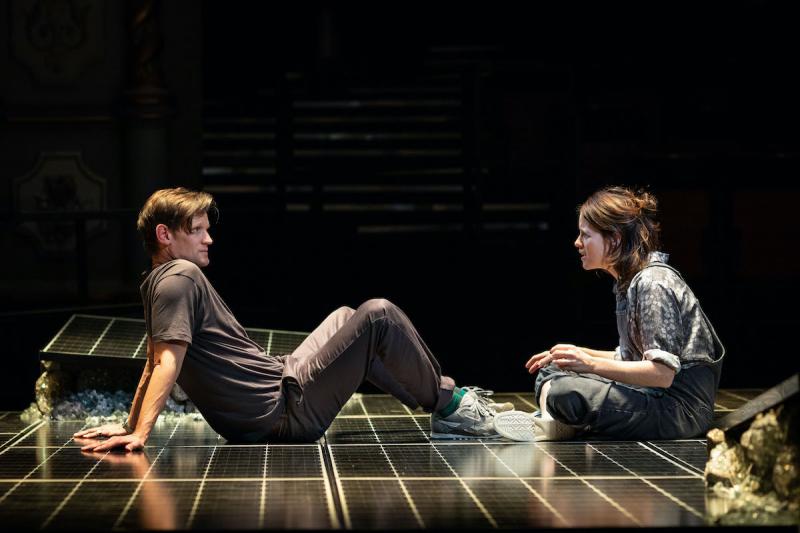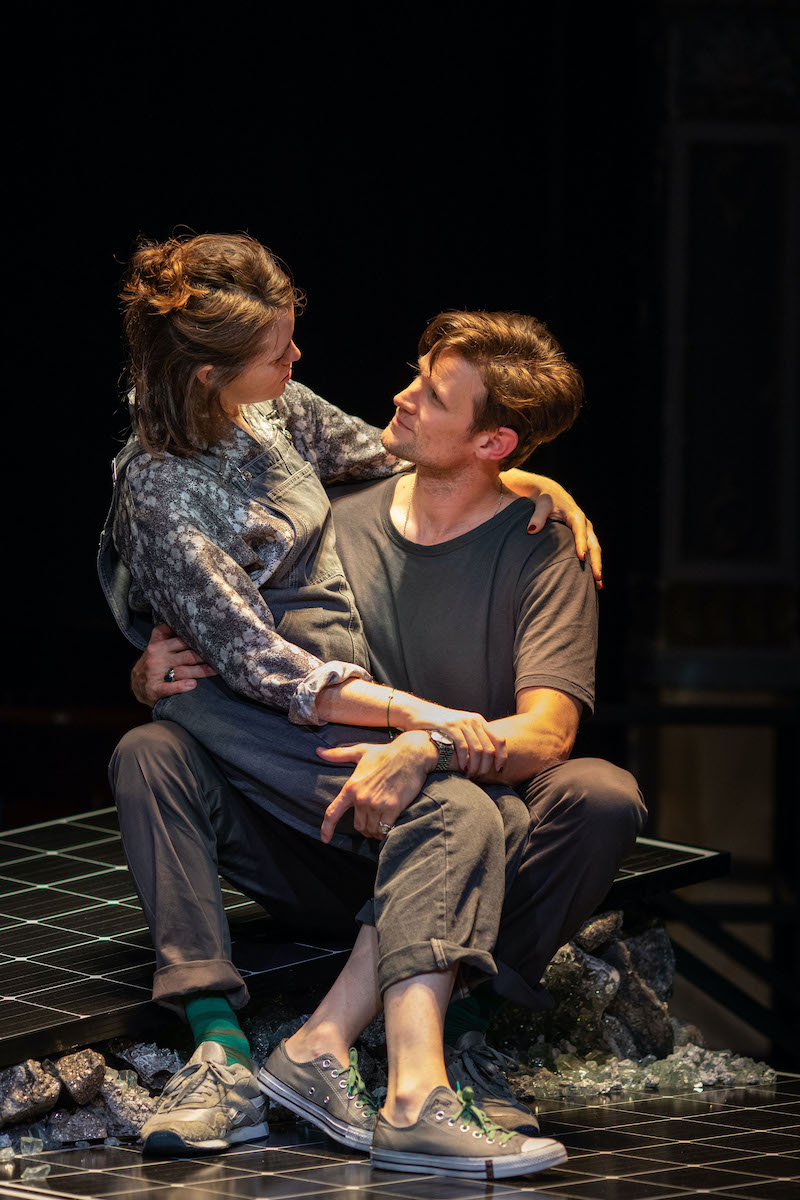Lungs, Old Vic review - deluxe casting and slick delivery | reviews, news & interviews
Lungs, Old Vic review - deluxe casting and slick delivery
Lungs, Old Vic review - deluxe casting and slick delivery
Claire Foy and Matt Smith elevate Duncan Macmillan's rather toothless parenting drama

Playing our monarch and her husband in The Crown has made actors Claire Foy and Matt Smith into TV drama royalty, so reuniting the pair onstage guarantees a hot ticket.
There’s a level of skill and intelligence to its fraught, circuitous exchanges that hints at the dazzling writer Macmillan has become. Despite fine performances from its two stars in a neat, deft production by Matthew Warchus, however, it’s a bland, self-regarding affair that feels decidedly longer than its 80-minute duration. Greta Thunberg and Extinction Rebellion may be keeping environmental issues in the headlines, but a similar sense of urgency is scarce here: beneath a faint greenwash of larger ideas, the piece is far more preoccupied with domestic politics. And like a mewling infant yet to cut its milk teeth, it lacks bite.
A nameless man and woman – young, wholesome, metropolitan – are queuing in Ikea when he drops the baby-bomb: should they get pregnant? “It’s like you’ve just punched me in the face and then asked me a maths question,” she gasps, blind-sided – and indeed everything about both play and production has a mathematical precision. Rob Howell’s set is a gridded platform that resembles graph paper, disrupted at the corners by glittering bedrock and overhung by scorching lights. On it, Foy and Smith – dressed almost like children themselves, she in dungarees, he in baggy trousers and T-shirt – engage in jittery conversational debate about love, sex, family, and the pros and cons of bringing a child into a world we’re destroying.
Round and round they go, scarcely pausing for breath, bickering, bantering, soothing and provoking, tirelessly circumnavigating their own navels. Time passes in sudden jolts. There are crises and commonplace personal tragedies, but only in the last few minutes, when the play confronts the ultimate reality that we leave life just as we come into it – alone – does it acquire much emotional heft.
 The fractious disputes quickly become wearing. Foy’s female half of the partnership in particular – who, we learn, is a PhD student brain box – is required to deliver lengthy diatribes, in which she chivvies, castigates and interrogates Smith’s more laidback record-store worker and would-be rock musician. Being trapped in their company can be corrosive – so much so that if you were sitting behind them on a bus, you might be tempted to jump off and throw yourself under it. Their dilemmas and conflicts may (for some) be relatable; they’re hardly revelatory.
The fractious disputes quickly become wearing. Foy’s female half of the partnership in particular – who, we learn, is a PhD student brain box – is required to deliver lengthy diatribes, in which she chivvies, castigates and interrogates Smith’s more laidback record-store worker and would-be rock musician. Being trapped in their company can be corrosive – so much so that if you were sitting behind them on a bus, you might be tempted to jump off and throw yourself under it. Their dilemmas and conflicts may (for some) be relatable; they’re hardly revelatory.
Nevertheless, Foy and Smith have an effortless chemistry, and they handle the dialogue and action, moment by moment, beat by beat, with commitment and conviction. The fluctuations of desire, the missteps and mistakes, the tenderness and the rifts – all feel keenly observed. The characters they’re playing, though, are generic, with little texture or personality beyond their well-educated niceness, their repeated assertions that they are essentially “good people”. The gender politics, too, feel slightly stale and reactionary – Foy talks of dreaming of babies while playing with dolls as a little girl, and describes the perfect wedding day as a woman’s lifelong fantasy. Smith, meanwhile, is portrayed as more sexually driven – and it’s implied that Foy will have, to some extent, to mother him as well as their baby.
The language, so jagged elsewhere, sometimes takes a swerve into mawkish Hallmark territory. And the notion that having kids is somehow an imperative – the whole point of our existence – is never satisfactorily interrogated. There are hints that the motive for procreation can be impure – that it might be narcissistic, say, a desire to ward off mortality, or simply an adherence to social convention – but they’re barely explored. Ultimately, this is an unremarkable play that has been lavished with luxury casting – and while there’s nothing uniquely demanding about these roles, it’s Smith and Foy that make it worthwhile. Plenty of new and prospective parents will probably nod along with the drama’s anxieties and wryly humorous observations. And, no argument: it’s slickly delivered.
rating
Explore topics
Share this article
The future of Arts Journalism
You can stop theartsdesk.com closing!
We urgently need financing to survive. Our fundraising drive has thus far raised £49,000 but we need to reach £100,000 or we will be forced to close. Please contribute here: https://gofund.me/c3f6033d
And if you can forward this information to anyone who might assist, we’d be grateful.

Subscribe to theartsdesk.com
Thank you for continuing to read our work on theartsdesk.com. For unlimited access to every article in its entirety, including our archive of more than 15,000 pieces, we're asking for £5 per month or £40 per year. We feel it's a very good deal, and hope you do too.
To take a subscription now simply click here.
And if you're looking for that extra gift for a friend or family member, why not treat them to a theartsdesk.com gift subscription?
more Theatre
 The Line of Beauty, Almeida Theatre review - the 80s revisited in theatrically ravishing form
Alan Hollinghurst novel is cunningly filleted, very finely acted
The Line of Beauty, Almeida Theatre review - the 80s revisited in theatrically ravishing form
Alan Hollinghurst novel is cunningly filleted, very finely acted
 Wendy & Peter Pan, Barbican Theatre review - mixed bag of panto and comic play, turned up to 11
The RSC adaptation is aimed at children, though all will thrill to its spectacle
Wendy & Peter Pan, Barbican Theatre review - mixed bag of panto and comic play, turned up to 11
The RSC adaptation is aimed at children, though all will thrill to its spectacle
 Hedda, Orange Tree Theatre review - a monument reimagined, perhaps even improved
Scandinavian masterpiece transplanted into a London reeling from the ravages of war
Hedda, Orange Tree Theatre review - a monument reimagined, perhaps even improved
Scandinavian masterpiece transplanted into a London reeling from the ravages of war
 The Assembled Parties, Hampstead review - a rarity, a well-made play delivered straight
Witty but poignant tribute to the strength of family ties as all around disintegrates
The Assembled Parties, Hampstead review - a rarity, a well-made play delivered straight
Witty but poignant tribute to the strength of family ties as all around disintegrates
 Mary Page Marlowe, Old Vic review - a starry portrait of a splintered life
Tracy Letts's Off Broadway play makes a shimmeringly powerful London debut
Mary Page Marlowe, Old Vic review - a starry portrait of a splintered life
Tracy Letts's Off Broadway play makes a shimmeringly powerful London debut
 Little Brother, Soho Theatre review - light, bright but emotionally true
This Verity Bargate Award-winning dramedy is entertaining as well as thought provoking
Little Brother, Soho Theatre review - light, bright but emotionally true
This Verity Bargate Award-winning dramedy is entertaining as well as thought provoking
 The Unbelievers, Royal Court Theatre - grimly compelling, powerfully performed
Nick Payne's new play is amongst his best
The Unbelievers, Royal Court Theatre - grimly compelling, powerfully performed
Nick Payne's new play is amongst his best
 The Maids, Donmar Warehouse review - vibrant cast lost in a spectacular-looking fever dream
Kip Williams revises Genet, with little gained in the update except eye-popping visuals
The Maids, Donmar Warehouse review - vibrant cast lost in a spectacular-looking fever dream
Kip Williams revises Genet, with little gained in the update except eye-popping visuals
 Ragdoll, Jermyn Street Theatre review - compelling and emotionally truthful
Katherine Moar returns with a Patty Hearst-inspired follow up to her debut hit 'Farm Hall'
Ragdoll, Jermyn Street Theatre review - compelling and emotionally truthful
Katherine Moar returns with a Patty Hearst-inspired follow up to her debut hit 'Farm Hall'
 Troilus and Cressida, Globe Theatre review - a 'problem play' with added problems
Raucous and carnivalesque, but also ugly and incomprehensible
Troilus and Cressida, Globe Theatre review - a 'problem play' with added problems
Raucous and carnivalesque, but also ugly and incomprehensible
 Clarkston, Trafalgar Theatre review - two lads on a road to nowhere
Netflix star, Joe Locke, is the selling point of a production that needs one
Clarkston, Trafalgar Theatre review - two lads on a road to nowhere
Netflix star, Joe Locke, is the selling point of a production that needs one
 Ghost Stories, Peacock Theatre review - spirited staging but short on scares
Impressive spectacle saves an ageing show in an unsuitable venue
Ghost Stories, Peacock Theatre review - spirited staging but short on scares
Impressive spectacle saves an ageing show in an unsuitable venue

Add comment